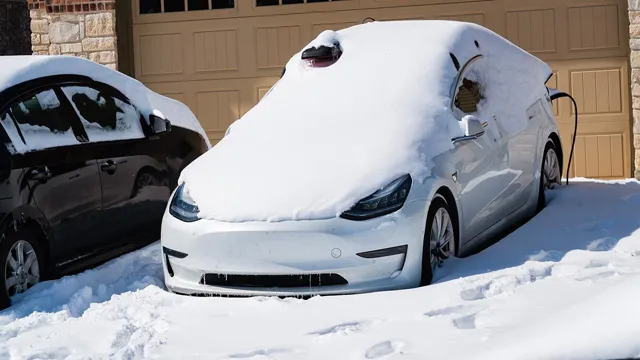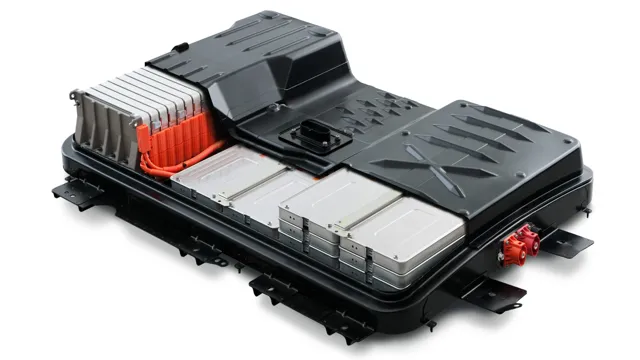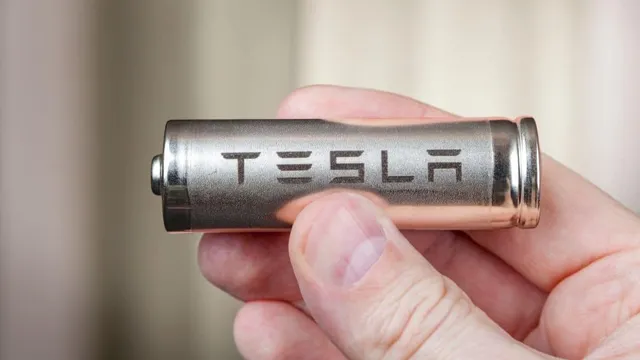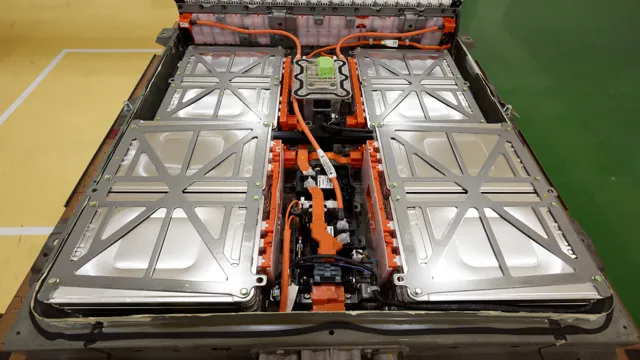Maximizing Your Electric Car’s Battery Life During Winter: Tackling Cold Climate Challenges
Winter is coming and it’s not just your wardrobe that needs a little extra TLC. Anyone who owns an electric car knows that colder temperatures can impact its battery life, and let’s be honest, that’s the kind of thing that can make any driver feel a little uneasy. You might be wondering how much an electric car’s battery life is actually affected in winter, and what you can do to keep your car running smoothly in the chilly season.
Don’t worry, we’ve got you covered. In this blog post, we’ll explore the various factors that can impact your electric car’s battery life in winter and provide some tips to help you make it through the season without any major hitches. So buckle up, grab yourself a cozy blanket, and let’s dive into the fascinating and ever-evolving world of electric cars in winter.
Effects of Cold Temperatures on Battery Life
One of the main challenges of owning an electric car is maintaining its battery life during extreme weather, particularly in winter. Cold temperatures can have a significant impact on the performance of electric car batteries, reducing their efficiency and storage capacity. In fact, studies have shown that battery life can decrease by up to 40% in frigid environments.
This is because low temperatures slow down the chemical reactions that take place inside the battery, making it harder for it to generate and store power. This can lead to reduced driving range, longer charging times, and a shorter overall lifespan of the battery. To combat this issue, many electric car manufacturers are incorporating innovative thermal management systems that can regulate the temperature of the battery and improve its performance in cold weather.
Likewise, electric car owners are recommended to take appropriate measures to minimize battery exposure to low temperatures, such as parking in garages or using battery blankets to keep the battery warm. As electric cars become more popular, it’s important to understand the effects of cold temperatures on battery life and how to optimize their performance in different weather conditions.
Data on Battery Performance in Winter
Winter’s cold temperatures can have a significant impact on battery life. One key finding is that batteries tend to lose their charge faster in freezing temperatures. This is because the chemical reactions inside the battery slow down, making it more challenging for the battery to produce the required voltage.
As a result, your car battery may not even pass the test of starting your engine on a frigid morning. Similarly, it also affects the charging efficiency of the battery. In colder climates, you may find that the battery takes longer to charge and doesn’t fully recharge, leading to a shorter lifespan overall.
Thus, it’s important to take steps to protect your battery during the winter months, such as investing in a battery blanket, keeping it fully charged, and avoiding extended periods of inactivity. Remember, a little effort can go a long way in extending the life of your battery.
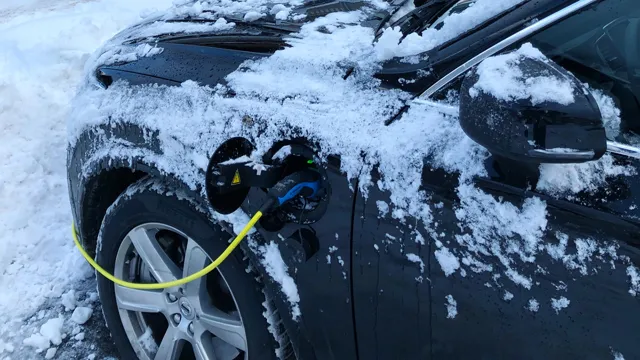
The Importance of Preheating the Battery
Preheating the battery is essential to maintaining its longevity, especially during cold temperatures. The effects of cold temperatures on batteries can be devastating, as they can cause the battery to lose its charge faster and ultimately reduce its lifespan. This is because the chemical reactions that occur within the battery are slowed down in colder temperatures.
So, the colder the battery, the slower it will charge and discharge. Preheating the battery before use can help to increase its performance and minimize the damage caused by cold temperatures. Just like how your muscles need to be warmed up before exercising, the battery needs to be warmed up before it can function optimally.
So, it’s always a good idea to preheat your battery before starting your car or using any other battery-operated device in extreme cold temperatures. By doing so, you can increase the lifespan of your battery and save yourself from unnecessary expenses in replacing them frequently.
Tips for Maximizing Battery Life in Winter
As winter sets in, electric car owners worry about how the cold weather would affect their vehicle’s battery life. Unfortunately, the cold weather affects an electric car battery life in winter, reducing its range. However, there are tips to maximize the battery life and ensure it is warm enough to function optimally.
Firstly, preheat the cabin and battery before driving to take advantage of the stored heat. Additionally, charge your electric car more frequently to keep the battery warm and to maintain the state of charge. Furthermore, avoid using a fast charger in cold weather as it can damage the battery.
Finally, park your car in a garage or covered area to keep it as warm as possible. By following these tips, you can limit the effects of the cold on your electric car battery life in winter and enjoy your eco-friendly vehicle all year round.
How to Reduce Battery Drain in Cold Weather
When the temperature starts to drop outside, your smartphone battery starts losing its juice faster than usual. That’s because cold weather affects battery performance. But don’t worry, there are ways to maximize battery life during winter.
First, keep your phone in a warm place like your pocket or inside a jacket to keep it from getting too cold. Second, optimize your phone’s settings by turning off features like location services, Wi-Fi, and Bluetooth when you’re not using them. These features drain your battery even more when the temperature is low.
Third, use a high-quality charger to keep your phone fully charged before you leave the house. A low battery and cold weather can cause your phone to shut down unexpectedly. Finally, avoid using your phone when it’s freezing outside as this can cause battery drain and may even damage your device.
To sum it up, keeping your phone warm, optimizing settings, using a good charger, and avoiding overuse can help you maximize battery life during cold weather.
The Benefits of Driving in Eco Mode
During winter, it’s essential to maximize your vehicle’s battery life in order to avoid any inconveniences on the road. One easy way to do this is by utilizing eco mode, which adjusts your vehicle’s power and torque to better conserve energy. Not only will this increase your battery efficiency, but it can also save you money on gas by promoting smoother acceleration and reduced strain on your engine.
However, keep in mind that driving in eco mode can affect your car’s performance and acceleration, so it might not be the best option for a long highway trip. The key is to find the right balance that works for you and your vehicle’s specific needs. Additionally, making sure your battery is fully charged and warming up your car’s battery before driving can also help maximize its lifespan during winter months.
By taking these simple steps, you can ensure your vehicle runs smoothly and efficiently even during the coldest of seasons.
The Importance of Maintaining Battery Charge
Maintaining battery charge is crucial, especially during winter, when low temperatures can drastically reduce battery life. To maximize battery life, it’s important to keep it charged as much as possible. One way of doing this is to turn off apps and features that consume a lot of battery, such as Bluetooth and location services, when they’re not in use.
It’s also a good idea to avoid overcharging, as this can potentially damage the battery, and to use an original charger or one that’s compatible with your device to ensure that the battery isn’t being overloaded. In addition, keeping the phone out of direct sunlight and away from heat sources can prevent it from overheating, which can damage the battery. By following these simple tips, you can maintain your phone’s battery charge, extend its life, and avoid the frustration of a dead battery when you need it the most.
Choosing the Right Winter Tires for Electric Cars
When winter comes, electric car owners need to make sure they choose the right tires to preserve their car battery life. As temperatures drop, the battery’s capacity decreases, and it requires more power to perform basic functions. This can lead to a shorter driving range and a decrease in overall battery life.
Fortunately, there are several winter tire options on the market that can help mitigate this issue. Look for tires with a deep tread and a softer compound, which will provide better traction on slippery roads and reduce rolling resistance. Additionally, make sure to inflate the tires properly to maximize their performance and longevity.
By choosing the right winter tires, electric car owners can ensure that their vehicles operate safely and efficiently throughout the colder months.
Understanding How Tires Affect Battery Life
When it comes to electric cars, choosing the right winter tires is crucial for maximizing your battery life. Unlike gasoline-powered cars, electric cars rely heavily on battery power, and as the temperature drops, the battery’s performance weakens. Winter tires can help improve your car’s overall performance by providing better traction on cold and icy roads, which ultimately reduces the strain put on the battery.
The keyword here is “winter tires,” which is essential when it comes to driving an electric car in the winter. When selecting winter tires, it’s essential to choose ones with low rolling resistance, which helps reduce energy consumption and improve the battery’s longevity. In summary, opting for the right winter tires is a wise investment that can ultimately save you money by extending your battery life and keeping you safe on the road.
Comparing Performance of Winter Tires
Choosing the right winter tires for electric cars can make a significant difference in their performance during harsh winter conditions. When comparing the performance of various winter tires, it’s essential to consider factors such as their traction on snow, ice, and wet roads, tread life, noise level, and rolling resistance. High-quality winter tires such as Bridgestone Blizzak and Michelin X-Ice provide excellent traction on slippery roads, making them ideal for electric cars.
They also have a longer tread life, ensuring better value for money. Additionally, winter tires with low rolling resistance offer better fuel efficiency, ultimately saving you money in the long run. Therefore, it’s crucial to research different winter tire options and choose the ones that best suit your electric car’s needs.
Conclusion: Ensuring Optimal Battery Life in Winter Months
In conclusion, just like how we bundle up in winter to protect ourselves, electric car batteries also need some extra love and care during the colder months. The decrease in battery life during winter can be attributed to the cold weather affecting chemical reactions within the battery itself. However, with proper preheating techniques and conscientious charging habits, the battery can stay warm and work efficiently.
So, don’t let the winter blues get you down – keep your electric car charged and cozy, and enjoy the ride all year round!”
FAQs
How does cold weather affect the battery life of electric cars?
Cold weather can negatively impact the battery life of electric cars as it reduces the efficiency of the battery and reduces its capacity. This means that electric cars may lose range in cold weather, leading to decreased overall performance.
Are there any ways to improve the battery life of electric cars in winter?
Yes, there are several ways to improve the battery life of electric cars in winter. These include preheating the battery before driving, charging the car indoors, and reducing the use of heater and other power-consuming features while driving.
Can extreme cold weather damage the battery of electric cars?
Yes, extreme cold weather can damage the battery of electric cars, especially if they are not properly maintained. It can cause the battery to freeze and reduce its capacity, leading to decreased range and overall performance.
How can I ensure my electric car’s battery lasts longer during the winter season?
To ensure your electric car’s battery lasts longer during the winter season, you should keep it charged at all times, store it in a warm place when not in use, preheat the battery before driving, and reduce the use of power-consuming features like the heater and headlights while driving. Additionally, you can consider using a battery warmer or insulating the battery to help it retain heat.
